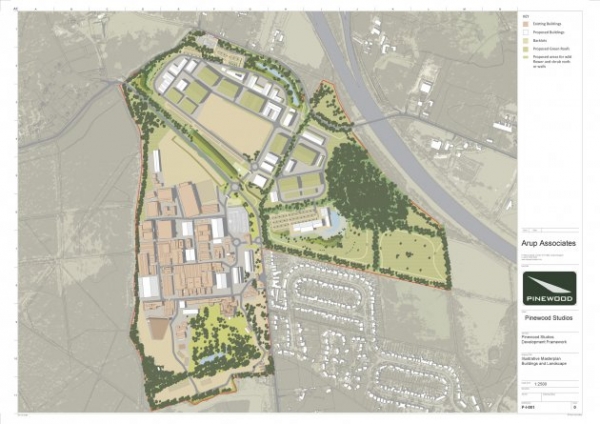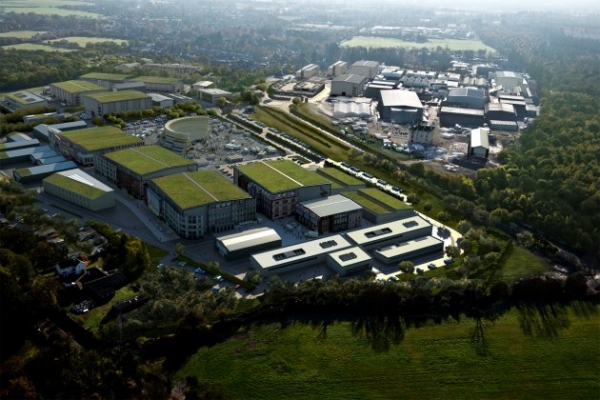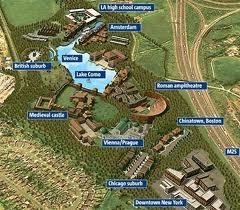Pinewood Studios appeal planning refusal
Pinewood Studios are to appeal South Bucks Council's decision over planning application, claiming 'national importance' of new development. In this article, we look at the story behind the application, the campaign, the refusal and the appeal of the Pinewood expansion......
On 15th May 2013, South Bucks Council refused Pinewood Studios' planning application for a new development to expand the existing site across two nearby Green Belt fields.
The 100,000 sq metre project was the second application to be rejected by the council, following the failure of ‘Project Pinewood’ in 2012. In a hearing at South Bucks Council on the 15th May, local campaigners claimed victory against the studio over this development on green belt land. Pinewood have now appealed to the Secretary of State for Communities and Local Government, Eric Pickles, to review the application.
The Proposal
Pinewood Studios submitted the proposal to SBDC (South Bucks District Council) on the 1st February 2013. The application was to expand the existing site, adding stages, workshops, production offices and streetscapes as seen in the images below.

The Plan
The £200m plan aimed to create over 3000 jobs in the creative sector. Pinewood Studios, owned by Peel Holdings, has much to gain if the expansion goes ahead. It is the favoured destination for most incoming productions and in order to keep up with demand, it must increase the available space.
Pinewood announced the plans on February 1st 2013, just days after Creative England Chief Exec, Caroline Norbury stated: "UK infrastructure is creaking both in terms of skills and in terms of facilities” at the launch of a report commissioned by Pinewood and PwC. More here

Once the plan was announced, local residents reunited their opposition group. The campaigners had successfully defeated the studios over Project Pinewood in 2012; a scheme to build streetscapes that doubled up as real accommodation for crew. This time, the application contained no plans for accommodation but the battle over this Green Belt land had begun....
 Both sides campaigned vigorously. Pinewood’s case painted a very positive outlook based upon the forecast for the business over the next 15 to 20 years, set to create 3,100 jobs and being a cornerstone of the booming creative industry. One of the few industries actually growing in the UK.
Both sides campaigned vigorously. Pinewood’s case painted a very positive outlook based upon the forecast for the business over the next 15 to 20 years, set to create 3,100 jobs and being a cornerstone of the booming creative industry. One of the few industries actually growing in the UK.
The re-assembled ‘Stop Project Pinewood’ group countered, disputing the forecasts and citing environmental concerns. Sylvie Lowe, chair of the ‘Stop’ group, raised concerns that the business plan could extend beyond film making and future applications could be for shopping malls, hotels and distribution centres.
The dispute focuses on the conversion of Green Belt land into a studio facility on an industrial scale. The fields around Pinewood are a former landfill site and the studio have owned the land for many years. However sensitive the development plan, it would undoubtedly make an impact on the local environment.
One of the key strata of the Stop Project Pinewood campaign has been concern about the increase in heavy traffic around Iver Heath. The campaign group does have strong ties to one of the existing local haulage companies in Iver Heath itself, undermining some of its objection. Part of the application bid included the overhaul of the vexatious 5-points roundabout to include a road directly to the studio, rather than through the village.
On the 10th May, 5 days before the SBDC hearing, The Guardian ran a story about losing the beloved Bond franchise overseas (read the article here), no doubt adding pressure to the council. The studio also received a last minute letter of support from Vince Cable, Secretary of State for Business, Innovation and Skills, giving his full support to the application.
We spoke to the campaign group and they were keen to assert that they are not ‘anti-Pinewood’ or ‘anti-expansion’. They would like to see the Peel group expand on other sites; citing Shepperton, Teddington, a new plot of land further along the M25 and going as far as to suggesting Manchester (MediaCity) as suitable locations to create a new production hub. It was clear that no-one from Pinewood had given explanation, context or reason that addressed the local residents concerns.
Why Pinewood?
Of the whole Peel group property portfolio, it’s no surprise the Pinewood site is favoured for expansion. Close to the M25, M40, M4 and Heathrow Airport, it is also within 40 minutes reach of the major post production houses in central London. Pinewood has the highest concentration of leading facilities companies in the UK, servicing every single aspect of film and TV production. The surrounding areas Buckinghamshire, Hertfordshire and the whole West London area are home to several thousand skilled technicians who are within easy reach of the studio. Neither Shepperton or Teddington Studios (both owned by Pinewood Group) have the transport links, space for expansion or an existing cluster of services and skills like at that Pinewood has.
Now that the BBC have closed their own London studios on Wood Lane, competition is rife to accommodate the corporation's shows; Elstree Studios bagged this year’s ‘Strictly’ and Wimbledon Studios are about to double in size. There is an increase in demand: an influx of productions through the Film Tax Credit, the TV Tax Credit and the BBC has surrended its own studios in London. Pinewood are building for the TV market as much as the movies; timing is an important factor in that build.
The Hearing
The application hearing took place at 4pm on the 15th May at the SBDC. A committee of 10 listened to petitions from Ivan Dunleavy, Lord Grade, The Earl of Stockton, local residents as well as district and county councillors.
At the end of a lengthy hearing the application was defeated. The vote was 6-4 against.
In a statement on the SBDC website, Chairman of the Planning Committee, Mr Ralph Bagge said:
“The Pinewood proposal is one of the most contentious and difficult planning applications that the Council has had to deal with....
Having carefully considered all the arguments for and against the proposals the Committee was on balance of the view that to have allowed this development of over 110 acres in the Green Belt and Colne Valley Park, would not only have caused significant degradation to the local environment but also harmed the quality of life for local residents.
It is of course open to Pinewood to appeal the Council’s refusal decision and if they do so then a Government Inspector will hold an Inquiry and decide whether to support the Council’s refusal or to grant permission against the local decision”
The Appeal
In a press release received Friday 31st May, Pinewood have appealed the decision citing "national importance" and the UK's "lack of capacity" to push the development through. The Studio have a strong support base and case to present. The decision over the appeal now rests with Eric Pickles MP, Secretary of State for Communities and Local Government.
Comment
There is much to be said for Pinewood's willingness and drive to invest in the UK creative sector and they do not make half measures with the scale shown in their planning applications. They want to build something that will be around for a long time. Can they succeed in getting planning permission via a Government inquiry? Would losing an inquiry permanently damage the credibility of future applications? If they choose to appeal, time will tell.
The whole industry wants better facilities, a better infrastructure and more importantly, jobs. If Pinewood can find a way to satisfy shareholders and win over the local council and its residents, the industry and economy will benefit. We can only hope a solution can be found to capitalise on this nascent golden era of production.